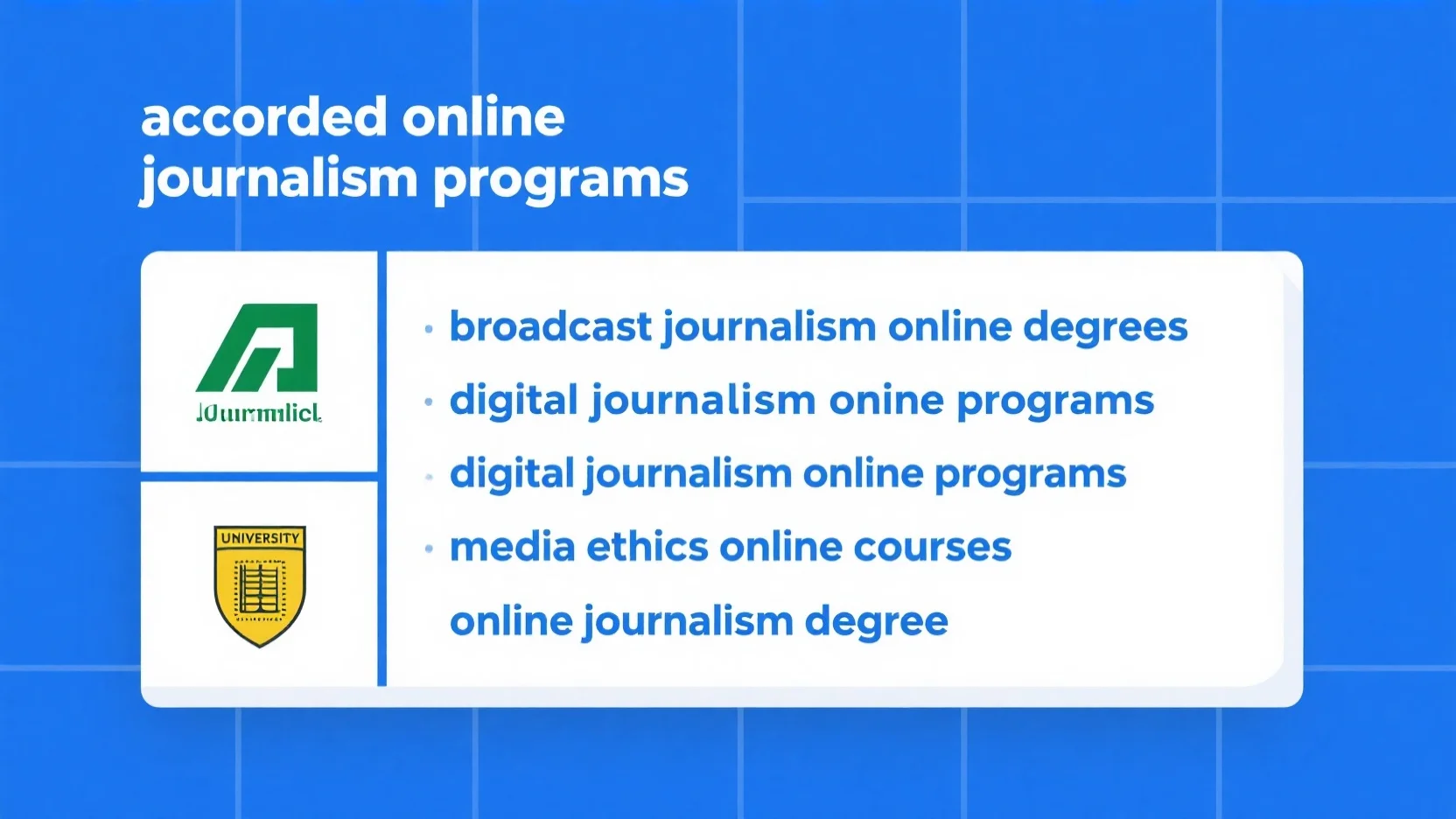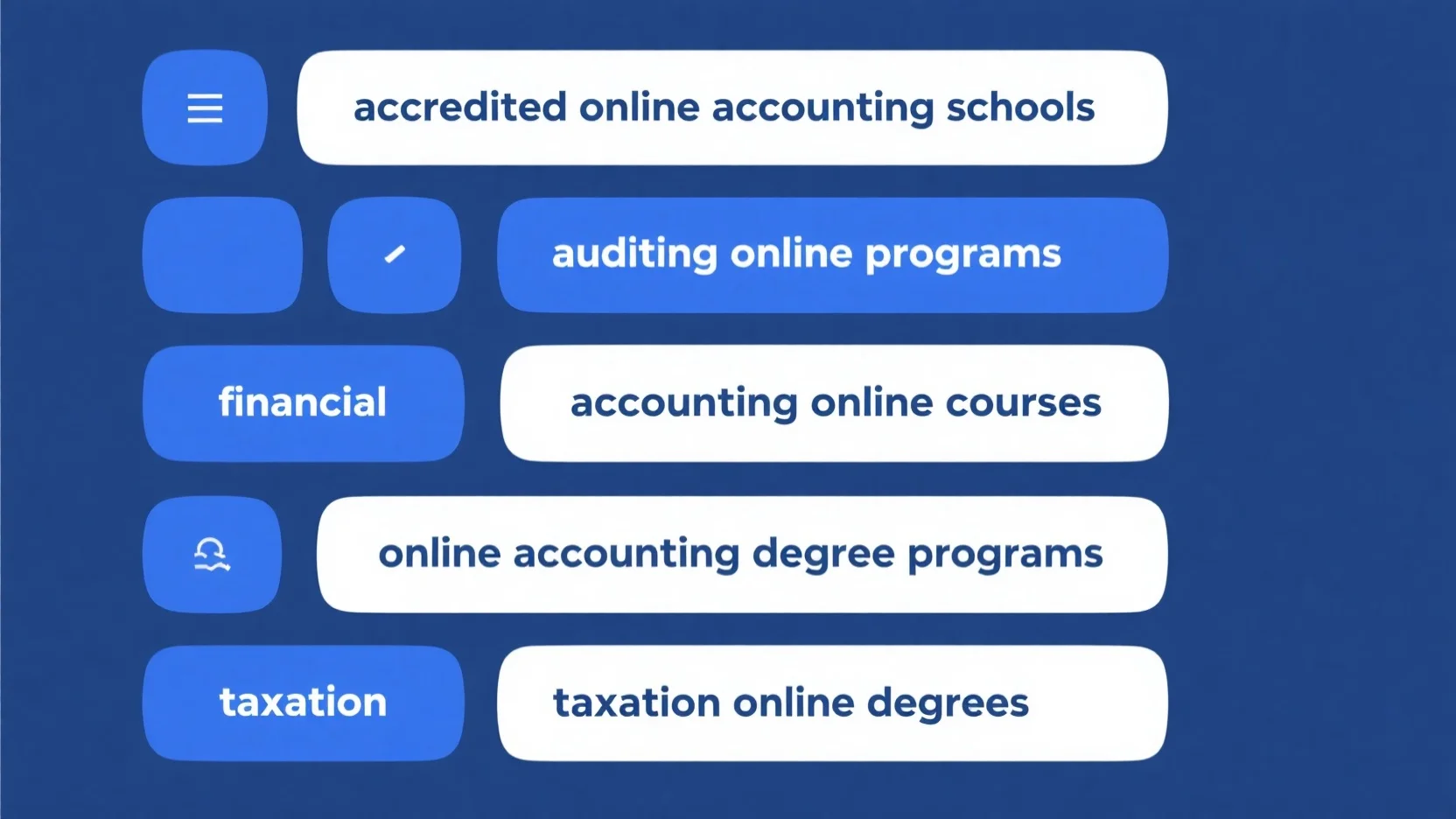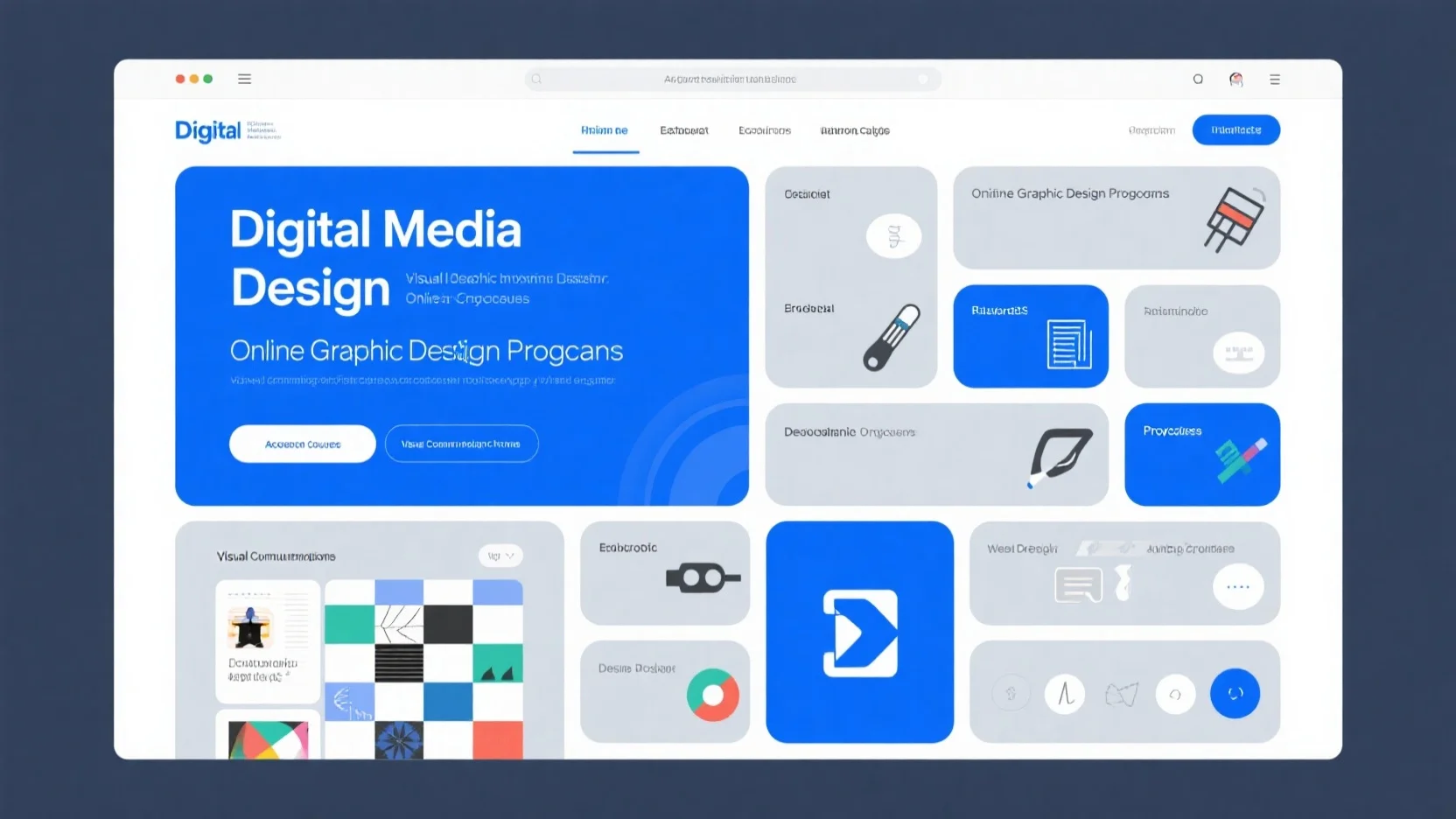Are you eyeing a top – notch online journalism degree? Look no further! The job market for media and communication is on the rise, with about 109,500 openings per year (BLS). According to the U.S. Department of Education and Pew Research Center, graduates are set for a promising future. Premium accredited programs from ACEJMC and NCTJ offer better career opportunities than counterfeit models. Get a Best Price Guarantee and Free Installation Included for your educational investment. With job prospects high in states like New York and California, start your journey today!
General Information
The field of online journalism education is expanding rapidly, with overall employment in media and communication occupations projected to grow about as fast as the average for all occupations from 2023 to 2033, creating about 109,500 openings each year on average (BLS). This growth sets a promising backdrop for those considering an online journalism degree.
Admission Requirements
Freshman Applicants
Admission to the program as a freshman applicant requires successful attainment of a high school diploma, state – recognized high school equivalent or GED. This is the basic educational threshold that institutions set to ensure that incoming students have the foundational knowledge necessary to succeed in a journalism program.
Transfer Applicants
Transfer applicants must have a cumulative grade – point average of 2.0 or higher from all institutions previously attended to be considered for admission. This GPA requirement helps the institution gauge the academic performance of transfer students and their ability to keep up with the rigorous journalism curriculum.
Pro Tip: If you’re a transfer student with a GPA slightly below 2.0, consider reaching out to the admissions office. They may be willing to consider other factors, such as relevant work experience or extracurricular activities.
Curriculum
Broadcast Journalism Degree
A degree in broadcast journalism online can best prepare students to be on the cutting edge of how we communicate. Through comprehensive studies in broadcast production, communication, media history, regulations, management, and sales, students gain a well – rounded education. For example, some programs may include courses like "The Constitution and the Media" which offer a grounding in moral reasoning and an introduction to professional ethics as both moral doctrine and as an evolving response to changing social and industrial conditions in the media industries.
As recommended by leading industry tools for media education, students should look for programs that offer hands – on experience, such as internships or field studies. This practical exposure can significantly enhance a student’s understanding of the industry.
Job Prospects
The job market for journalism graduates is diverse. Overall employment in media and communication occupations is expected to grow at an average rate, and there are numerous opportunities in traditional and digital media. States with the highest employment levels for journalists are New York, California, Texas, Florida, and Georgia (BLS). There are also many online journalism class jobs available, such as technical writers, content marketing managers, and freelance editors.
Top – performing solutions include building a strong online portfolio and networking with professionals in the industry. You can start by contributing to online blogs or local news websites to gain experience and visibility.
Try our journalism job prospects calculator to estimate your potential opportunities based on your skills and location.
Average Salaries
Salary data from the U.S. Department of Education’s (USDOE) College Scorecard platform indicates that bachelor’s degree holders in journalism earn a median of $39,700 net of student – loan debt payments three years after graduation, ranking 14th out of 34 major groups. Median financial returns for master’s degree holders in journalism and communication are $49,300 three years after graduation, ranking 12th out of 26 master’s degree major groups.
For example, a Bachelor of Science in Organizational Communication has an average salary range of $48k – $122k, while a Bachelor of Arts in Magazine Journalism has an average salary range of $44k – $122k.
Comparison Table:
| Degree Type | Median Salary (3 years after graduation) | Ranking (Among major groups) |
|---|---|---|
| Bachelor’s in Journalism | $39,700 (net of loan debt) | 14th out of 34 |
| Master’s in Journalism and Communication | $49,300 | 12th out of 26 |
Key Takeaways:
- Admission requirements for online journalism programs vary for freshman and transfer applicants.
- Broadcast journalism degrees offer a comprehensive curriculum with a focus on practical skills.
- Job prospects are growing, with many opportunities in both traditional and digital media.
- Salaries can vary widely based on the degree type and specialization.
Accreditation
In the ever – evolving landscape of online journalism education, accreditation serves as a crucial marker of quality. According to the Pew Research Center, U.S. newsroom employment has fallen 26% since 2008, yet digital – native news organizations have seen growth. This shift indicates a dynamic job market where an accredited degree can give graduates an edge.
Accreditation Bodies
National Council for the Training of Journalists (NCTJ)
The National Council for the Training of Journalists (NCTJ) is a significant accreditation board in the journalism field. It is a charity of all media and accredits courses in journalism and other media areas. The NCTJ not only accredits undergraduate degree courses but also offers distance – learning, postgraduate degree courses, short courses, conferences, and fast – track options. For example, a journalism course accredited by the NCTJ gives students an advantage in the job market. An accredited course signals to potential employers that students have the relevant skills and abilities needed to work as journalists upon graduation.
Pro Tip: If you’re considering an online journalism degree and want to enhance your employability in the UK or certain international markets, look for programs accredited by the NCTJ. As recommended by leading media recruitment tools, NCTJ – accredited programs are highly regarded in the industry.
Accrediting Council on Education in Journalism and Mass Communications (ACEJMC)
The Accrediting Council on Education in Journalism and Mass Communications (ACEJMC) is responsible for evaluating professional journalism programs in U.S. colleges and universities. Currently, 120 schools are accredited by ACEJMC. It is recognized by the Council for Higher Education Accreditation (CHEA) for accrediting programs in professional journalism and mass communications in institutions of higher learning. ACEJMC does not rank programs; instead, it evaluates journalism programs based on established educational requirements and standards. This database is a valuable tool for prospective students to narrow down their search for accredited programs.
Top – performing solutions include using the ACEJMC database to explore programs that align with your academic and career goals. Try our online program comparison tool to easily compare ACEJMC – accredited programs.
Accreditation Requirements
ACEJMC Requirements
ACEJMC applies its standards and indicators in compliance with applicable laws and regulations. It also takes into account religious or cultural prescriptions and practices where appropriate. The council requires that graduates of accredited programs be aware of certain core values. ACEJMC does not define specific curricula, courses, or methods of instruction. It recognizes the uniqueness of each institution, safeguarding its cultural, social, religious context, mission, and resources. This means that each accredited program has the flexibility to offer a unique educational experience while meeting the overall standards set by ACEJMC.
Case Study: A small liberal arts college with an ACEJMC – accredited journalism program was able to incorporate its strong focus on liberal arts education into the journalism curriculum. This allowed students to gain a well – rounded education while still receiving high – quality journalism training.
Pro Tip: When researching ACEJMC – accredited programs, look into the institution’s unique aspects and how they integrate with the journalism curriculum to find a program that suits your interests and learning style.
Differences between Online and On – Campus Requirements
While the core accreditation standards set by bodies like ACEJMC and NCTJ apply to both online and on – campus programs, there are some differences. Online programs often require students to have strong self – discipline and time – management skills due to the asynchronous nature of many courses. For instance, an online student may need to complete assignments on their own schedule within set deadlines, without the daily in – person interaction of an on – campus class.
On – campus programs, on the other hand, may offer more hands – on, in – person experiences such as internships, on – site reporting, and face – to – face interactions with professors and peers. However, online programs can sometimes provide greater flexibility, allowing students to balance work, family, and education.
Comparison Table:
| Requirement | Online Programs | On – Campus Programs |
|---|---|---|
| Interaction | Asynchronous; limited real – time interaction | Face – to – face; more immediate feedback |
| Flexibility | High; can study from anywhere at any time | Lower; fixed class schedules |
| Hands – on Experience | May rely on virtual internships and projects | More opportunities for on – site internships and reporting |
Key Takeaways:
- Accreditation is vital in online journalism degrees, with important bodies like NCTJ and ACEJMC setting standards.
- ACEJMC – accredited programs ensure a certain level of quality while allowing institutional uniqueness.
- Online and on – campus programs have different requirements, each with its own set of advantages. Consider your learning style, lifestyle, and career goals when choosing between them.
Emerging Career Opportunities
According to a Pew Research Center analysis of data from the Bureau of Labor Statistics, U.S. newsroom employment has fallen 26% since 2008. However, while newspapers have seen steep job losses, digital – native news organizations have seen considerable gains. This shift highlights the new and emerging career opportunities in the journalism field.
Online Journalism Jobs
There are currently 3,687 open jobs for online journalism in the United States. These jobs often require a bachelor’s degree in journalism or a related field. For example, many positions involve writing stories for social media and websites.
Pro Tip: To stand out in the online journalism job market, build a strong online portfolio showcasing your writing and reporting skills across different digital platforms. As recommended by platforms like Indeed, employers often look for candidates who can demonstrate their ability to engage audiences in the digital space. Try our online portfolio builder to create an eye – catching showcase of your work.
Media Streaming Services, Social Networks, and Digital Content Platforms
The rise of media streaming services, social networks, and digital content platforms has opened up new avenues for journalism graduates. These platforms need content creators, editors, and curators who can provide engaging and accurate news and features. For instance, streaming services might need journalists to produce in – depth documentaries or to cover the latest entertainment news.
A data – backed claim from a SEMrush 2023 Study shows that digital content consumption on streaming platforms has increased by 35% in the last two years.
Pro Tip: Stay updated with the latest trends and algorithms of these platforms. Understanding how to optimize content for platforms like YouTube or TikTok can significantly enhance your employability in this sector. Top – performing solutions include using analytics tools provided by these platforms to understand user behavior and preferences.
Public Relations Roles
Journalism graduates are well – suited for public relations roles. Their writing, communication, and research skills are highly valued in the PR industry. A case study of a PR agency hired a journalism graduate who was able to quickly draft compelling press releases and pitch stories to the media. This led to increased media coverage for the agency’s clients.
According to the U.S. Bureau of Labor Statistics, the demand for public relations specialists is expected to grow by 11% from 2022 to 2032.
Pro Tip: Build a network of contacts in the media while studying journalism. This network can be invaluable when you transition to a PR role, as it can help you get media coverage for your clients.
Educational Field
With an online journalism degree, you can also explore opportunities in the educational field. You could teach journalism courses at the high – school or college level. Many online journalism programs offer courses in media ethics, which can be a valuable asset for educators. For example, a journalist with experience in investigative reporting can bring real – world examples to the classroom.
The median salary of high – school journalism teachers in the United States is around $55,000 per year, as per the U.S. Department of Education data.
Pro Tip: Consider getting additional teaching certifications, such as a teaching license in your state, to enhance your chances of getting a teaching position.
Specialized Fellowships and Internships
Specialized fellowships and internships are great ways to gain hands – on experience and make industry connections. For example, some fellowships focus on environmental journalism or data – driven journalism. These opportunities can provide you with unique experiences that set you apart from other candidates.
Data from a recent industry report shows that 70% of journalism graduates who completed an internship or fellowship landed a job within six months of graduation.
Pro Tip: Apply for as many fellowships and internships as possible during your studies. Tailor your applications to highlight your relevant skills and interests for each opportunity.
Other Transferable Career Options
Journalism graduates have skills that are transferable to other careers. For example, their research and communication skills can be useful in fields such as market research, government communications, or corporate communications. A journalism graduate might work in a corporate communications department, handling internal and external communication for a large company.
Key Takeaways:
- The journalism field is evolving, with many emerging opportunities in digital – native platforms.
- There are diverse career paths for journalism graduates, including online journalism, public relations, education, and more.
- Specialized fellowships, internships, and building industry connections are essential for a successful career in journalism.
- Salaries vary depending on the career path, but the demand for journalism – skilled professionals remains strong in various sectors.
FAQ
What is an accredited online journalism degree?

An accredited online journalism degree is a program recognized by established accreditation bodies like the NCTJ or ACEJMC. According to industry standards, these programs ensure quality education, preparing students for journalism careers. They cover various aspects, from broadcast to digital journalism, and adhere to specific educational requirements. Detailed in our [Accreditation] analysis, these degrees are valued by employers.
How to choose the right accredited online journalism program?
When choosing, start by considering accreditation bodies. Leading industry tools suggest focusing on programs from the NCTJ or ACEJMC. Evaluate the curriculum, looking for hands – on experience, like internships. Also, explore an institution’s unique aspects and how they fit your learning style. This approach is different from randomly selecting a program without research.
Steps for applying to an online broadcast journalism degree program?
First, check if you meet admission requirements. Freshman applicants need a high school diploma or equivalent, while transfer students require a 2.0 GPA. Next, gather necessary documents. Then, research available programs and apply to those that match your goals. As recommended by media education resources, also consider the program’s practical components. Detailed in our [Admission Requirements] section.
Online journalism degree vs on – campus journalism degree: What are the differences?
Online degrees offer greater flexibility, allowing study from anywhere at any time. However, they may have limited real – time interaction. On – campus degrees provide more in – person experiences, such as on – site internships. But they have fixed class schedules. Each has its pros and cons, depending on your lifestyle and learning preferences.




